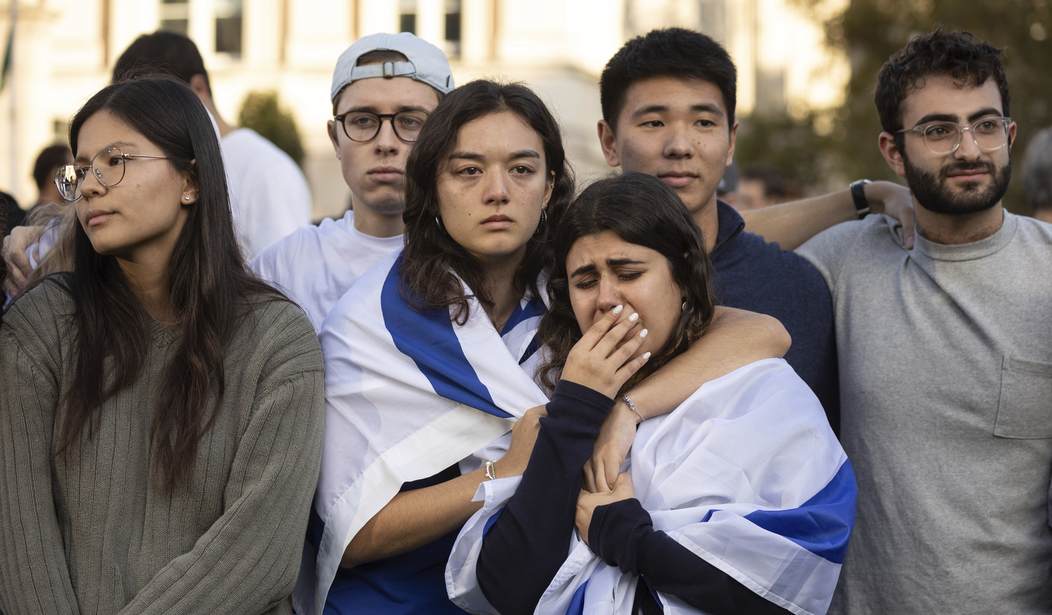Last November, we covered how Rep. Rudy Yakym (R-IN) had reached out to the diversity, equity, and inclusion (DEI) offices from 110 colleges and universities about the rise of antisemitism following the October 7 attack that Hamas perpetrated against Israel. Despite Yakym's request over what, if anything these institutions were going to do about it, there has been only a paltry response. All these months later, Townhall has learned that only five schools responded that they have a working definition of antisemitism. Now, Yakym is moving forward to combat such a surge of antisemitism with a new bill introduced on Thursday, the Promote Restoring Order To End Campus Targeting of Jewish Students and Faculty Act, or the PROTECT Jewish Students and Faculty Act.
Under the bill, the Higher Education Act of 1965 would be amended so that U.S. colleges and universities would be required to adopt the official working definition of antisemitism from the International Holocaust Remembrance Alliance (IHRA) as a condition of receiving Title IV federal funds for financial aid. According to the National Center for Education Statistics, 55 percent of undergraduate students received some form of federal financial aid for 2020. Thus, such a bill would have a powerful incentive on colleges and universities to adopt such a working definition, especially since they would otherwise risk steep declines in enrollment.
"Antisemitism is a certain perception of Jews, which may be expressed as hatred toward Jews. Rhetorical and physical manifestations of antisemitism are directed toward Jewish or non-Jewish individuals and/or their property, toward Jewish community institutions and religious facilities," reads that working definition, as adopted on May 26, 2016.
The bill also requires such institutions to have a statement that antisemitic conduct is prohibited on campus, and that such conduct may result in expulsion of the student or a termination of employment for an employee of that institution.
Students and employees would thus be clear on what conduct they could not engage in, and that there would be risks if they did. There would also be more clarity for investigators when incidents of antisemitism do come up.
Recommended
"The sheer number of disturbing antisemitic outbursts we continue to witness on college campuses in the wake of Hamas’ October 7 terrorist attacks show that far too many of these schools lack clear and coherent guidelines for combatting antisemitism. This is unacceptable, especially given that these colleges routinely police the most micro of microaggressions and bend the knee to the Left’s cultural agenda," Yakym told Townhall in a statement. "If these institutes of higher education want to continue receiving federal funds, they need to have clearly defined ways to root out antisemitism when it occurs. I’m proud to introduce this legislation to help ensure that Jewish students and faculty are safe on campus and that our colleges and universities are fighting – not fueling – antisemitism."
Those five schools, which responded and indicated they use that working, definition include Duke, the University of Tennessee, Ohio State, Kent State, and Oberlin.
Townhall viewed copies of responses from Duke and the University of Tennessee, both of which were dated on or just before the December 8 deadline. Both letters also came from the university's vice president of government relations.
"I call your attention to the “Examples of Prohibited Conduct” section of Duke University’s Policy on Prohibited Discrimination, Harassment and Related Misconduct, which references the International Holocaust Remembrance Alliance (IHRA) definition of antisemitism and includes examples of antisemitic conduct that could implicate the policy. As the policy emphasizes, every situation is unique and we evaluate all allegations on a case-by case basis to determine whether they implicate this or other Duke policies. This policy has been enacted several times since mid-October," a letter from Vice President of Government Relations Chris Simmons read in part.
"Since October 7 the university has stepped up police presence around the Freeman Center at Duke and installed additional security cameras outside of the buildings where students gather with their faith groups," his letter also noted. Nearly 200 individuals had gone through antisemitism training, through Jewish Life at Duke, which is available to all students, according to Simmons.
A letter from Vice President of Government Relations and Advocacy Carey Whitworth also indicated that "Tennessee state law requires our campus to take into consideration the working definition of antisemitism adopted by the International Holocaust Remembrance Alliance (IHRA) upon receiving a complaint from a person who alleges that antisemitism has occurred directly on campus or through electronic outreach. As a state institution we adhere to and are compliant with this state statute."
Included among those institutions that received a letter from Yakym but did not respond are those where there have already been instances of antisemitism on campus so far, such as Harvard, Cornell, Cooper Union, UPenn, UC Berkeley, George Washington University, George Mason, Georgetown, and Yale.
























Join the conversation as a VIP Member